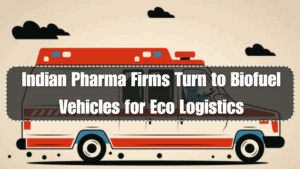The Indian pharmaceutical sector is driving straight into a greener future with a rapid shift toward biofuel use in pharma logistics in 2025. Facing mounting pressure from environmental regulations, supply chain inefficiencies, and carbon offset goals, pharma companies are adopting biofuel auto fleets as a sustainable alternative to conventional diesel-powered delivery vehicles.
This move aligns with India’s climate goals and its commitment to reduce greenhouse gas emissions under the Paris Agreement. Leading pharmaceutical brands including Sun Pharma, Cipla, and Biocon, alongside mid-level logistics providers, are actively participating in the transition to green logistics, particularly in medicine distribution.
This article explores how biofuel use in pharma logistics is transforming India’s health transport ecosystem, what technologies are being adopted, and how this change is impacting both operational efficiency and environmental performance.

Why biofuel use in pharma logistics matters in 2025
India is among the world’s largest medicine exporters and domestic consumers of critical healthcare products. Until recently, the pharmaceutical logistics chain relied heavily on diesel-run vans and trucks. These contributed significantly to urban pollution, operating costs, and carbon emissions.
As the demand for faster and cleaner pharma India logistics grows, so does the need for a shift in fuel technology. The use of biofuel auto fleets has emerged as the most viable alternative — not only from a sustainability standpoint but also from an economic one.
Here are key drivers behind this transformation:
-
Rising fuel prices and global oil dependency
-
Stricter environmental regulations for commercial fleet emissions
-
Pressure from investors for ESG-compliant operations
-
Increased public health awareness around urban pollution
-
Need for temperature-stable logistics using renewable power
The adoption of biofuel use in pharma logistics represents a practical and scalable way for companies to meet all these challenges head-on.
What are biofuel delivery vehicles and how do they work?
Biofuel auto vehicles are designed to run on renewable fuel sources derived from organic matter such as:
-
Ethanol (from sugarcane or corn)
-
Biodiesel (from vegetable oils or animal fats)
-
Compressed biogas (CBG) from agricultural waste
-
Algae-based fuel (in pilot phase in India)
These fuels power either modified internal combustion engines or hybrid powertrains that emit fewer pollutants than diesel. The vehicles used in pharma India logistics are typically retrofitted mini-vans and medium-duty trucks equipped to carry medicine in either ambient or cold chain formats.
Some newer models also feature:
-
Dual-fuel systems (biofuel + diesel backup)
-
GPS-based route optimization for lower fuel consumption
-
Refrigeration units powered by biogas compressors
-
Smart emissions monitors connected to regulatory dashboards
By integrating renewable energy with pharma logistics, companies are setting new benchmarks for green logistics in India’s booming healthcare sector.
How pharma companies are adapting
Pharma majors and third-party logistics (3PL) companies are moving fast. Here’s how they’re embracing biofuel use in pharma logistics:
-
Fleet replacement initiatives: Sun Pharma and Lupin have started replacing 30–40% of their older diesel fleets with biofuel-compatible vehicles in 2025.
-
Fuel contracts with biofuel suppliers: Biocon has signed exclusive deals with ethanol and biodiesel producers in Karnataka and Gujarat.
-
Green corridor creation: Cipla and Glenmark are piloting biofuel-powered delivery routes between manufacturing hubs and city distributors.
-
CSR & ESG Integration: Several companies have included biofuel use in pharma logistics as part of their annual ESG goals and sustainability reporting.
These initiatives have resulted in a 25% reduction in fuel costs and up to 35% drop in carbon emissions for participating firms — a win-win for business and the environment.
Government incentives and public-private partnerships
The Indian government has actively supported biofuel use in pharma logistics through policy and financial support:
-
Faster Adoption and Manufacturing of Hybrid and Electric Vehicles (FAME) scheme now includes incentives for biofuel logistics.
-
Ethanol Blending Program (EBP) subsidies extended to pharma logistics companies.
-
GST reductions on biofuels used for commercial pharma fleets.
-
State-level tie-ups for biofuel station setup in major industrial zones.
-
Custom duty waivers on biofuel conversion kits.
Public-private partnerships (PPPs) are also promoting green logistics. NITI Aayog has backed pilot programs in Delhi, Bengaluru, and Hyderabad to test scalable models for biofuel-powered medical supply vehicles.
FAQs
What are the cost benefits of using biofuel auto fleets?
Biofuels can reduce operational fuel costs by up to 30% depending on the fuel type and route efficiency, making it a financially attractive option for pharma companies.
Is there enough biofuel infrastructure in India?
While limited in some regions, biofuel stations are expanding under central schemes and PPPs in high-density pharma corridors.
Can refrigerated vans run on biofuel?
Yes, new biofuel-powered vans include refrigeration and thermal insulation options suitable for cold chain pharma delivery.
Are biofuels safe for medicine transport?
Absolutely. They offer stable, clean combustion and maintain required temperature ranges in logistics vehicles without affecting medicine quality.
Do small pharma companies also benefit?
Yes. Several logistics providers offer biofuel-powered transport as a service for MSMEs in the pharma sector.
Conclusion
The growing biofuel use in pharma logistics is more than an environmental statement — it’s a smart business decision. With tangible savings, lower emissions, and government support, the Indian pharmaceutical industry is leading a critical green revolution in health delivery. By embracing biofuel auto fleets and cutting down reliance on fossil fuels, India’s pharma transport is becoming cleaner, faster, and more reliable than ever before. The road ahead is not only sustainable — it’s already in motion.
Click here to know more.
